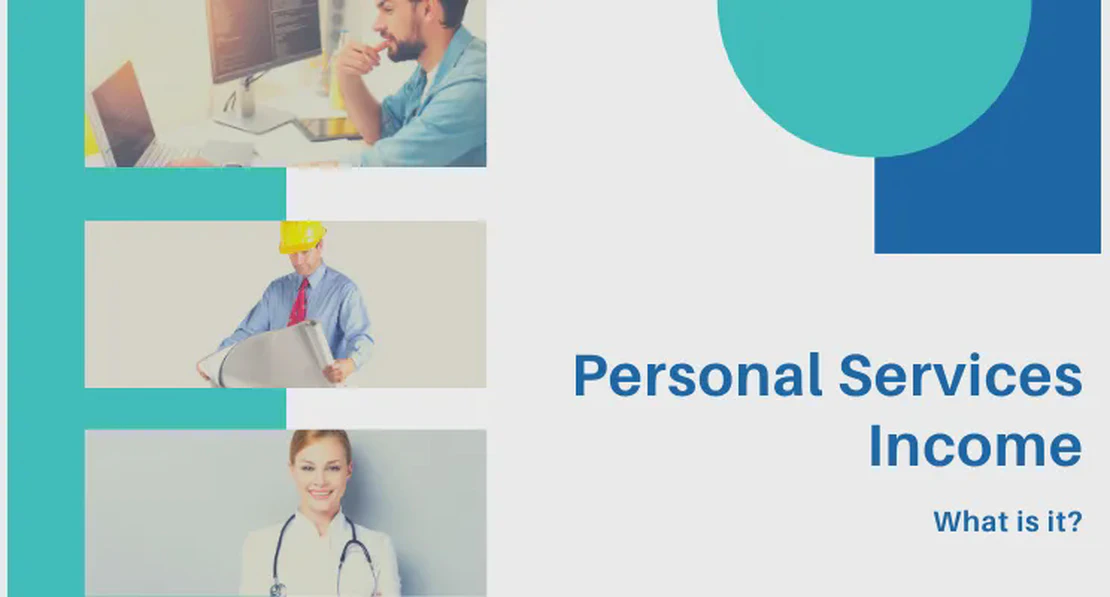
Personal services income. What is it?
- Yash Arora
- Tax , Individual taxes
- November 29, 2019
Personal Services Income (PSI) Issues
This article aims to cover Personal Services Income (PSI) issues faced by contractors, freelancers, medical professionals etc. Though Personal service income act has been in existence for a while, it is still a deeply misunderstood tax act. The article starts by explaining what PSI is and why was it introduced. Then it goes onto cover PSI rules and the tests to determine whether those rules apply.
What is Personal Services Income (PSI)?
Personal Service Income is income produced via your personal skills or efforts as an individual. It is not something that is derived through the sale of Goods. Income is classified as PSI when more than 50% of the amount you received is for your labour, skills, or expertise.
A lot of professionals will fall into this category, for example, medical professionals, IT Consultants, Engineers etc. As the income derived comes from their personal skill or expertise.
Examples
- A taxpayer owns one truck and he is the only person who drives it. The income derived from driving the truck is not PSI because it is mainly produced using the truck and not mainly as a reward for the personal services of the taxpayer.
- A taxpayer provides IT consulting, but he does all the work involved in providing those services and uses the client’s equipment and software to do the work. The income derived would be treated as PSI as it is a reward for her personal efforts or skills.
- A taxpayer operates a computer spare parts business that sells computer hardware and software. the taxpayer spends his time on installing software for clients and the cost of installation is usually inbuilt into the price for the hardware. Income from these services would mainly be for the sale and supply of goods. It would not be the personal services income of the taxpayer as it is for the sale of goods.
- A taxpayer is a partner with a large law firm. None of the firm’s ordinary or statutory income is PSI because it is produced mainly by the firm’s structure and not mainly for his personal efforts or skills.
When was it introduced?
The Alienation of personal services income ACT was introduced in 2000. It was introduced to deter taxpayers from splitting income for tax avoidance purposes.
What is the purpose of Personal services income rules?
PSI rules aim to treat individuals who are earning income derived from their personal exertion the same way that an employed individual would be treated, i.e. in the hands of the individual deriving it. It also limits the deductions that you can claim
For example, you won’t be able to claim the following against PSI if PSI rules apply:
- rent, mortgage interest, rates or land tax for your home (or your associate’s home)
- payments to your spouse, or other associates, for non-principal work such as secretarial duties
- expenses that you would generally not be able to deduct as an employee.
Now if you receive Personal services income, then the next step is to determine whether you pass or fail the PSI rules.
PSI rules basically limit the deductions and your reporting obligations.
What are the tests to determine whether PSI rules apply?
The main tests to determine if PSI rules apply are:
- Results Test
- 80% Test
- Unrelated Clients
- Business Premises Test
- Employment Test
You also have an option to get a personal Services business determination if you do not pass the above tests due to circumstances beyond your control.
Flowchart to determine whether Personal services income rules apply?

Results Test
You pass the results test if you satisfy all the following conditions for at least 75% of the PSI income earned in any year:
- You were being paid to produce a specific result(s); and
- You provided the tools and equipment necessary (if any) to produce the result(s); and
- You were liable for the cost of rectifying any defective work.
If you are being paid on an hourly basis, you clearly don’t pass the results test.
Take an example of a cosmetic surgeon who is being paid to achieve a particular result. Secondly, if further work is required, they are expected to provide that with no further income.
It is very unlikely for a contractor/medical professional that works for an hourly/daily rate to pass the above test.
The 80% Rule
If your PSI income does not satisfy the results test, it then goes through the second set of tests known as the 80% rule.
The 80% test is defined as: if 80% or more of the income is from one entity, then the PSI rules apply.
If 80% or more of the PSI is not from one source, then PSI rules don’t apply provided one of the below tests are also passed:
- The Unrelated Clients Test – This test is satisfied if the individual provides services to 2 or more unrelated clients and it was obtained from making offers to the public. It is worth noting, that there are special provisions for Commission agents regarding PSI rules. This allows an agent to be a PSB even if they have one principal or receive more than 80% from one principal. For more info see section 87-40 ITAA 1997.
- The Business Premises Test– This test is satisfied if the entity maintains business premises at which they conduct their PSI activities, they have exclusive use, and they are physically separated from their home and premises of clients. -The Employment Test – This test is passed if at least 20% of the income being generated can be attributed to an employee that is not an associate. OR employ an apprentice for at least 6 months Getting Paid through an Agency: As per the tax office, there has to be a definite connection between the offer of services and engagement of work by making an offer to the public. It includes advertising in a newspaper, magazine, business directory; maintaining an internet Website; or word-of-mouth referrals. As per the tax, office offering services through a labour-hire firm or registering with an agency is not considered offering services to the public under the unrelated client’s test.
However, it is interesting to note that in Fortunatow v Commissioner of Taxation the Federal Court allowed for the taxpayer’s appeal on AAT decision that the taxpayer did not pass the “unrelated clients test”. The courts found that the second condition can be satisfied where services were advertised to the public through an online medium such as Linkedin. This basically means that the unrelated client’s test can be satisfied if the individual advertises its services and the services are provided to two or more unrelated end clients through a labour-hire/recruitment agency. ATO is still contemplating an appeal and whether it is appropriate.
Personal services business Determination (PSB)
Taxpayers can always apply for a PSB determination if the income from one source is more than 80%. It is the only way for it to be treated as a business
Tax Office cannot issue a Determination unless it is satisfied that the individual or the entity meets certain criteria.
What if You Don’t Pass the Results Test or 80% Test?
PSI rules apply, i.e. deductions are limited to what an employee can claim. You can, however, claim the following:
Salary/wages and superannuation paid to associates for performing principal work
Salary paid to a spouse for admin is not allowed
Entity maintenance deductions like bank fees, ASIC fees etc. can be claimed. Car expenses can also be claimed for one car, however, it will be subject to FBT provisions
Expenses incurred in gaining work
License fees, insurances etc.
What Happens if You Pass One of the Tests?
You are conducting a personal services business. PSI rules do not apply (You can pay market rate for non-principal work an associate and claim a deduction, occupancy costs on your home office)
In theory, income from personal services businesses can be split with associates or retained in a company structure. However, that can violate Part IVA ITAA 1936. Please refer to TR 2001/8
ATO requires that the PSI earned is paid to the professional who did the work after payments of reasonable salary and superannuation contributions for an associate and other genuine business expenses.
Immediate Asset deduction rules
An individual or personal services entity that derives personal services income and passes one of the four tests i.e. they are conducting a personal services business, they are entitled to claim simplified depreciation provisions including the immediate asset write off subject to turnover conditions
Even if a company fails the PSI tests they can still access the simplified depreciation rules if they genuinely carry on a business under ordinary principles. This means that they can access the immediate deduction rules and the SBE pooling rules
Conclusion
Where you earn personal services income through a business structure, you need to determine whether you pass the PSI tests, or would the PSI rules apply. One can use the personal service income decision tool to determine whether PSI rules will apply for not.
Where personal exertion income is split inappropriately with associates, the ATO is likely to consider this tax avoidance and ignore any tax benefits obtained.
The information contained on this web site is general in nature and does not take into account your personal situation. You should consider whether the information is appropriate to your needs, and where appropriate, seek professional advice.
Related Posts

Should You Buy Or Lease Your Business Assets?
To Buy or To Lease: A Business Decision There are certain items of equipment, machinery and hardware that are essential to the operation of your business – whether it’s the delivery van you use to run your home-delivery food service, or the high-end digital printer you use to run your print business.
Read More
Christmas Parties And Presents – And Tax!
Christmas Parties, Presents, and Tax Christmas is a splendid time to acknowledge and reward your employees and other associates by celebrating and giving gifts.
Read More
Put The Customer At The Centre Of Your Business To Drive Sales
A Starter’s Guide to Selling Relevantly Advances in technology have impacted the way customers research products and services, and how they shop.
Read More